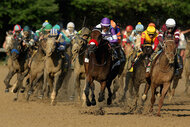Everything Olympian Jackie Joyner-Kersee Has Accomplished Since Dominating the Heptathlon
Team USA’s former titan of the track now uses her dauntless energy and legendary status to uplift the underprivileged youth in her hometown of East St. Louis, Illinois.
The heptathlon. While few of us know what the event actually entails, Jackie Joyner-Kersee’s unrivaled, decade-long dominance in the Olympic sport lies at the heart of why Sports Illustrated named her the greatest female athlete of the 20th century in 1999. Let that sink in.
Much in the same way that Carl Lewis approached tackling the multitude of events he competed in, Joyner-Kersee could've spent a lifetime perfecting any one of the seven disciplines featured in the women’s heptathlon. But to truly be great, the athlete, who was named by her grandmother after President John F. Kennedy’s beloved wife Jacqueline, knew no portion of the seven-tiered contest could be overlooked.
For more on the Olympics:
Gold Zone, The Live Whip-Around Show Highlighting All The Best Olympics Drama, Coming To Peacock This Summer
Shawn Johnson on "Turning Off Fear," Motherhood, and a Surprising Standout Olympic Memory
Sprinter Michael Johnson Continues to Inspire Others After Making Olympic History
What is the heptathlon?
Comprised of the 100-meter hurdles, high jump, shot put, 200-meter sprint, long jump, javelin throw; and 800-meter race, none of the disciplines was more important than another. With each requiring an equally immense amount of focus as they did tireless training — Joyner-Kersee even had to overcome respiratory challenges stemming from her asthma — it was Joyner-Kersee’s tenacious approach toward preparation that led to her capturing three Olympic gold medals across four competitions — the Los Angeles Games in 1984, the 1988 Games in Seoul, Korea, the Barcelona Games in 1992 and the 1996 Games in Atlanta, Georgia — in addition to one silver (heptathlon) and two bronze medals (long jump).
Though she was the first woman to score back-to-back Olympic golds in the heptathlon and the first African American woman to win an Olympic medal in the long jump, as prolific of an athlete as she was — she still owns the world record of 7,291 points in the women’s heptathlon — her selfless commitment to the Jackie Joyner-Kersee Foundation and other philanthropic institutions is what truly elevates this Olympic legend into a league of her own.
The Jackie Joyner-Kersee Foundation
Established in 1988, the Jackie Joyner-Kersee Foundation seeks to instill in youth in and around the surrounding area of East St. Louis, Illinois, with the “dream, drive and determination necessary to succeed in academics, athletics and leadership,” according to the foundation’s social media. As an unwavering resource and life-long advocate for enriching children’s education, the sister-in-law of the immortalized Florence “Flo Jo” Griffith Joyner notes that, while winning three Olympic gold medals was the pinnacle of her career, her proudest moment occurred away from the track, when she graduated with a degree in history from the prestigious University of California at Los Angeles (UCLA) where she was also an All-American forward on the Bruins’ basketball team.
Joyner-Kersee has shared that the most satisfying aspect of her work is when she gets to impart on her apt pupils the invaluable wisdom she’s cultivated through the vast spectrum of her life experiences. “Each of us has a story, and each of us has something we’re passionate about,” posted Joyner-Kersee on X, the social platform formerly known as Twitter. “I truly believe that your passions should drive you, and they will help you find a way to continue to connect the dots.”
Athletes for Hope
Considering the immeasurable impact that the world of sport has had on Jackie Joyner-Kersee’s life — she even tried professional basketball after first retiring from track in 1998 — it’s no surprise that she blended lessons she learned from all of those experiences with her unyielding philanthropic efforts in education and community revitalization to found Athletes for Hope in 2007. With the help of other cherished athletic icons — Andre Agassi, Muhammad Ali, Mia Hamm and Jeff Gordon — Joyner-Kersee established the organization to ultimately provide athletes with the resources, information, and knowledge on how to turn their dreams of charitable visions into a reality. With the aim of inspiring the next generation of athletes to carry on the founders’ original mission, the organization launched its Athlete Leadership Council, headlined by perennial NBA All-Star Stephen Curry, in January 2024.
Joyner-Kersee’s legacy of mentorship and uplifting future generations doesn’t stop with youngsters either. Recently retired five-time Olympian and seven-time gold medalist Allyson Felix revealed the indelible impact Joyner-Kersee had in helping her forge her own track and field career.
“Jackie has always been an athletic inspiration to me in the way she carried herself,” noted Felix to Popsugar in 2023. “She has a sense of grace to everything she does, and I admire that. Jackie has taught me to have patience and always see the bigger picture. She has been an incredible example of how to be a role model. The way she has poured into me — and not only cared about how I perform, but how I am as a person — has meant the world to me. I definitely want to emulate that as I mentor younger athletes.”
“Jackie has been by my side during all of the high and low moments of my career,” Felix added. “I'm grateful that in my darkest moments, I knew that I could turn to her for support.
Jackie Joyner-Kersee's Legacy
Though the link between Kersee and her storied history of record-breaking athletic accolades is unforgettable, she hopes that she’ll be remembered not just for what she did within her sport, but more importantly, her strides to leave the world in a better of a place than she found it.
“What I hope other people will remember about me one is that I was a great human being, a person that gave up my time,” revealed Kersee to Stony Brook University. “Not just focused on my athletic achievements is really understanding what Jackie Joyner-Kersee the person stands for and why I was motivated to do things that I felt was necessary to help others to believe in their own dreams.”
She continued, “To me, if people are able to tap into that, the essence of me, not just the, I call it the materialistic side of winning medals and accolades — yes, that comes along with the territory, but I think what I stand for [is most important], and I always strive to not only be a great athlete but a great person.”


































